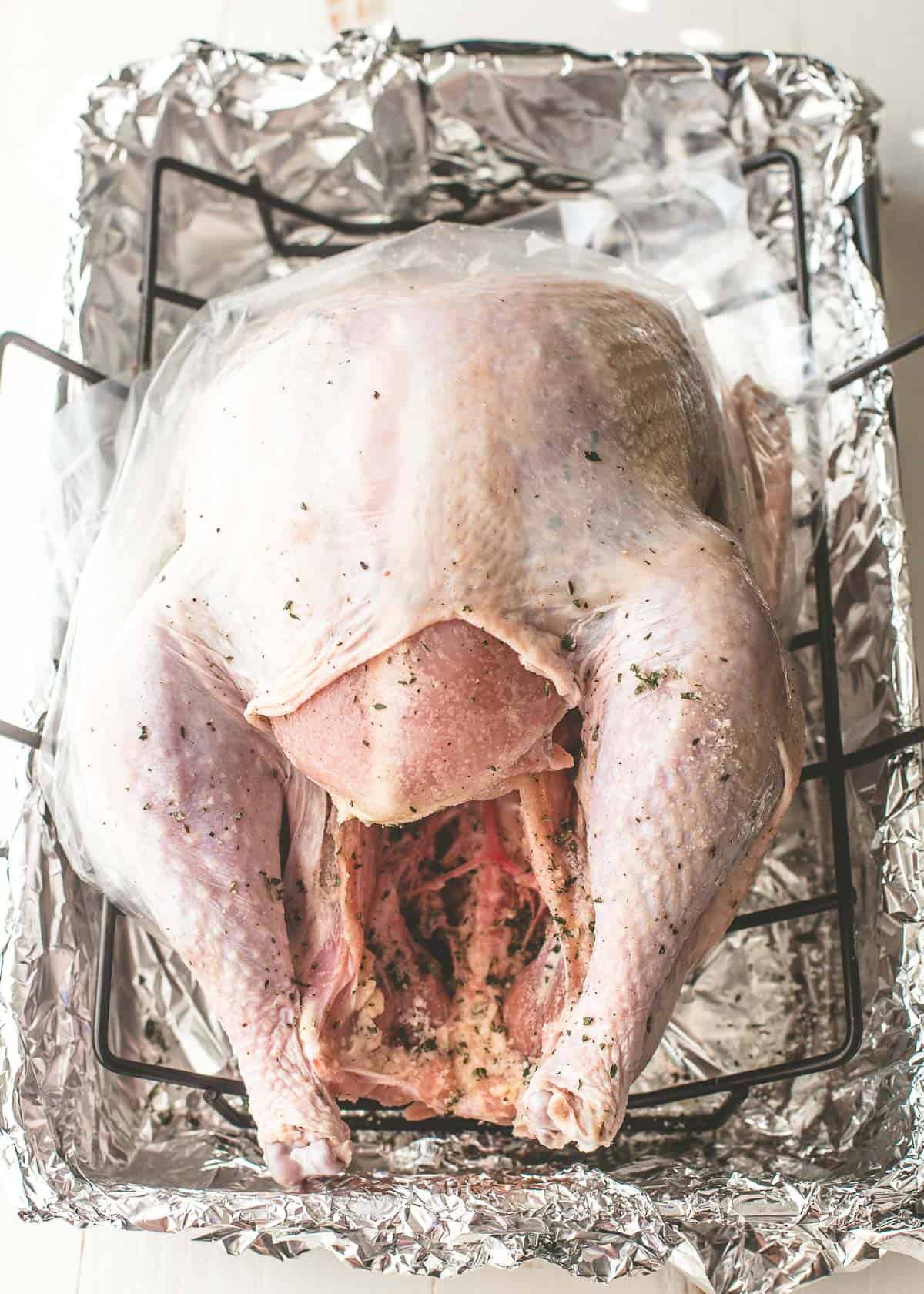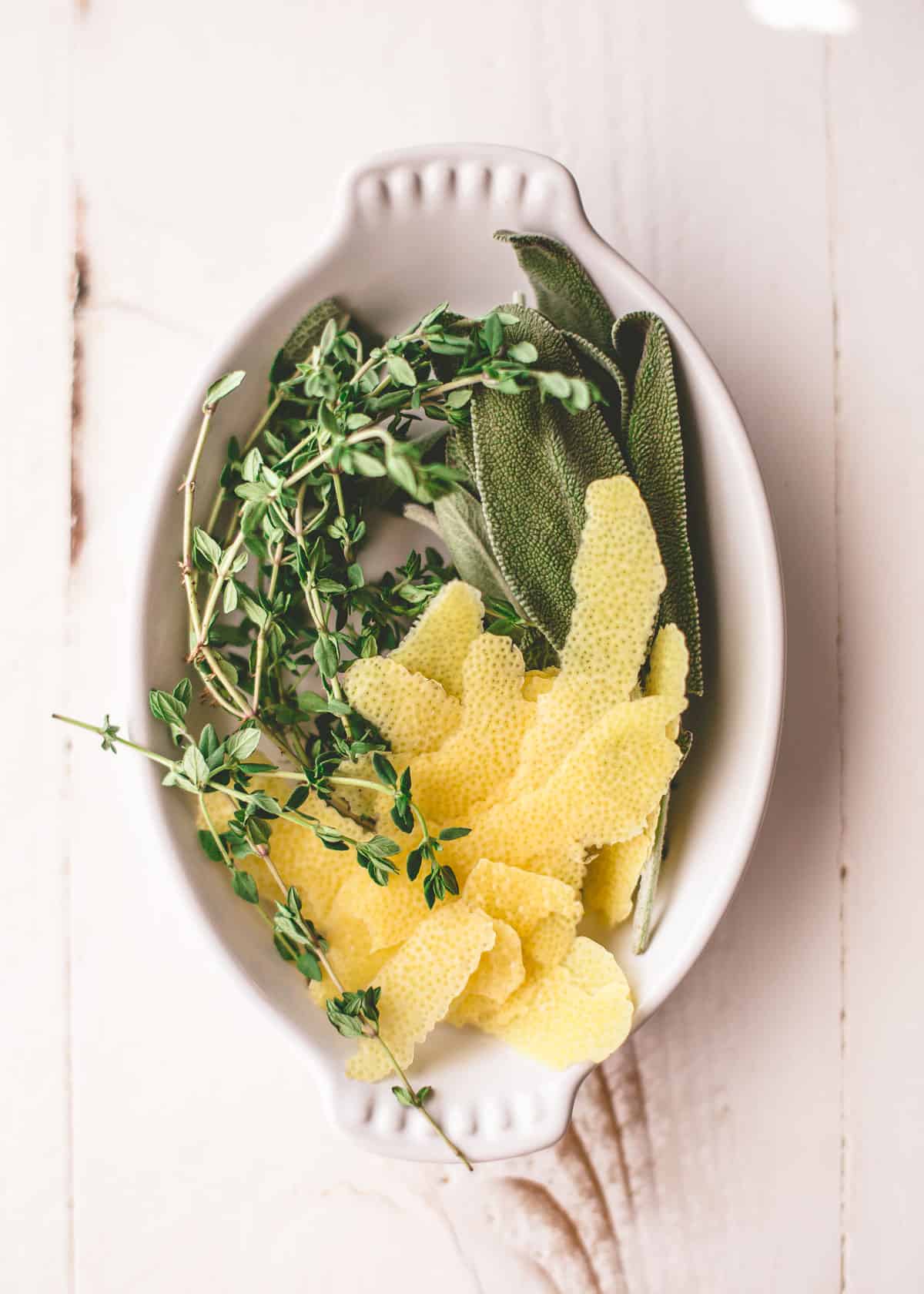Brining a turkey can help to ensure tender, juicy meat that is full of flavor. But have you ever wondered what is better – unbrined, dry brined, or salt water brined turkey? We did a side-by-side comparison. Read on for the results.
For years, I used a salt water brine to prepare my turkey for roasting. But lately it’s becoming increasingly popular for chefs and recipe developers to recommend a dry brine in which you rub the meat with salt and let it rest, allowing the salt to infuse the meat. A lot of the bigger food-centric websites (like Serious Eats and New York Times Cooking Section) recommend dry brining.
I set out to test three methods of roasting a turkey in my home kitchen. I ordered three 14-lb organic turkeys and roasted them 1) without a brine (using my Simple Roasted Turkey method), 2) with a dry brine, and 3) with a salt water brine. My recipes for dry brine and salt water brine can be found at the bottom of the post.
I rounded up some taste testers and did side-by-side comparison of the three turkeys. Results below!
Brining a turkey before roasting it is a technique that has become very popular in recent years. But is it really necessary to brine your turkey for Thanksgiving? Here is a comprehensive guide on the pros and cons of brining, as well as tips for how to brine a turkey if you choose to do so.
What is Brining?
Brining is the process of soaking meat in a saltwater solution also known as a brine before cooking. The brine is typically made by dissolving salt and sugar in water along with aromatic ingredients like herbs, spices, citrus, onions, and garlic.
There are two main types of brines
-
Wet brine – The turkey is fully submerged in the brining solution. This is the most common method.
-
Dry brine – Salt and seasonings are rubbed directly onto the turkey, which then sits uncovered in the fridge allowing the salt to penetrate the meat.
The science behind brining has to do with osmosis – the movement of water across a semi-permeable membrane from an area of low solute concentration to an area of high solute concentration. The salt in the brine dissolves muscle proteins which allows the turkey to absorb more moisture.
Benefits of Brining Turkey
There are several advantages that brining can provide:
-
Moist, juicy meat – Brining makes the turkey incredibly moist and juicy, even the typically dry white breast meat.
-
Flavor infusion – The brine seasons the turkey both on the surface and all the way to the bone. This amplifies the overall flavor.
-
Room for error – Brined turkey remains moist even if you accidentally overcook it a bit past the optimal temperature.
-
Tenderized texture – The salt breaks down muscle fibers, making the meat more tender.
-
Crispy skin – Wet brined skin often crisps up very nicely in the oven.
Downsides of Brining
However, there are also some potential downsides to brining:
-
Time commitment – Full brining takes 8-24 hours. This requires advance planning.
-
Fridge space – A brining turkey takes up a lot of valuable fridge real estate.
-
Messy process – Wet brining in particular can be messy and requires handling raw turkey.
-
Diluted flavor – Too much water absorbed can dilute the natural turkey flavor.
-
Overly salty – If brined too long, the turkey may taste too salty.
Should You Brine Your Turkey?
Whether you brine your turkey or not comes down to personal preference. Here are some things to consider:
-
If you’ve never brined before, it’s worth trying once to see if you like the results. Many people swear it’s the best, juiciest turkey.
-
Make sure to only brine turkeys that have not already been pre-brined. Look for labels like kosher, self-basting, enhanced or basted.
-
If short on time or fridge space, an unbrined turkey can still be juicy and delicious. Monitor cooking temp and don’t overcook.
-
Brining provides a bit of insurance against overcooking, but is not mandatory for a tasty bird.
How Long to Brine a Turkey
Most experts recommend brining for 12-24 hours for optimal moisture and flavor infusion:
- 12 hours – good medium brine time
- 24 hours – maximum time to avoid over-brining
After 24 hours, remove the turkey from brine, rinse, pat dry, and refrigerate.
Tip: If not ready to cook after brining, a turkey can be refrigerated for 1-2 days post brine before roasting.
Wet Brine Method
Here is a basic method for wet brining:
Brine Ingredients:
- 1 gallon water
- 1/2 cup salt
- 1/2 cup brown sugar
- Herbs and spices (optional)
Process:
-
Combine brine ingredients and stir until salt and sugar dissolve. Cool completely before using.
-
Place turkey in brine bath and refrigerate 12-24 hours. Keep turkey fully submerged.
-
Remove turkey from brine and rinse thoroughly. Pat turkey dry.
-
Roast turkey as desired, being careful not to overcook.
-
Allow turkey to rest 20 minutes before carving for juicy meat.
Dry Brine Method
For a dry brine, rub salt directly onto the turkey 2-3 days before roasting:
Ingredients:
- Kosher salt
- Herbs and spices (optional)
Process:
-
Pat turkey dry. Loosen skin from breast.
-
Apply about 1 tsp kosher salt per pound under and on skin, and in cavity.
-
Refrigerate uncovered for 24-72 hours.
-
Roast turkey, monitoring temperature to avoid overcooking.
-
Let rest 20 minutes before slicing.
To Brine or Not to Brine
Whether you choose to brine your turkey or not, the most important things are to monitor the temperature as it cooks and let it properly rest before carving. An unbrined turkey can still be juicy if not overcooked.
If new to brining, give it a try this Thanksgiving to see if your family enjoys the results. But a delicious moist turkey can be achieved with or without brining. Use your preferred method and focus more on nailing the perfect roasting time. Let your Thanksgiving turkey traditions continue, brined or unbrined.

Should I Brine My Turkey?
Brining a turkey is totally optional. If you’re short on time or just want the most straight-forward method to roast a turkey, skip the brining step and just use the Simple Roasted Turkey method. Some people swear that brining yields the most tender, juicy meat, but it takes planning ahead.
Most importantly, you should only brine a turkey that has not been pre-brined by the company that processed it. If a turkey has been pre-brined, it should say so right on the packaging. Turkeys labeled as “basted”, “self-basted”, “kosher”, or “enhanced” are typically brined before you buy them and should not be brined at home. Brining a turkey again will run the risk of causing the turkey to be too salty.
Organic turkeys are usually a good bet if you want a turkey that hasn’t been pre-brined.
Pin this now to save it for later


Sugar and other Sweeteners in Brine
Adding sugar to a brine can add a subtle sweetness and help with browning of the skin as the sugars caramelize. A roast turkey will get nicely browned even without the added sugar, but you can add brown sugar or maple syrup to any brine recipe. (Add about ¾ as much sugar as salt.)
To Brine or Not to Brine Your Thanksgiving Turkey
FAQ
Does brining a turkey change the flavor?
Enhanced Flavor: Brining infuses the meat with a savory, seasoned flavor. The salt and additional spices or herbs used in the brine penetrate the meat, resulting in a more flavorful dish that requires less additional seasoning during cooking.
Should you brine a butterball turkey?
Brining your turkey prior to cooking will help ensure you end up with a deliciously moist and flavor-packed turkey for your next gathering.
How long to brine a 20 lb turkey?
- 12–14-lb. turkey: 16–18 hours.
- 14–16-lb. turkey: 18–20 hours.
- 16–18-lb. turkey: 20–22 hours.
- 18–20-lb. turkey: 22–24 hours.
Do most turkeys come pre-brined?
A lot of turkeys do come pre-brined, and I think that’s important to remember. Oftentimes they’re injected with a lot of liquid and a lot of salt. I personally don’t buy turkeys like that ’cause I don’t want to pay for water. I prefer to do my own brine.
